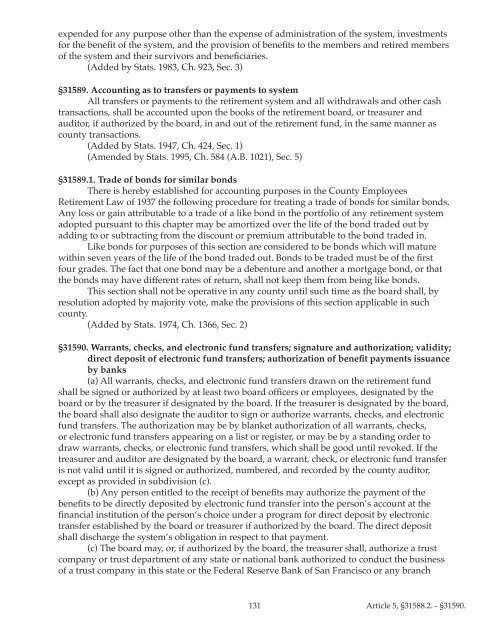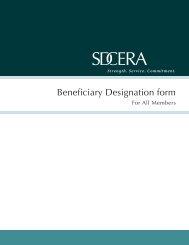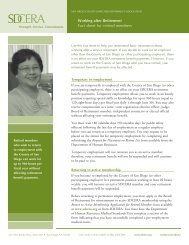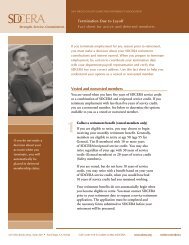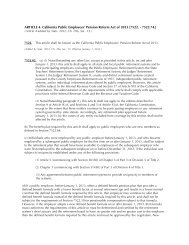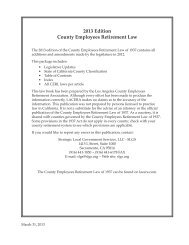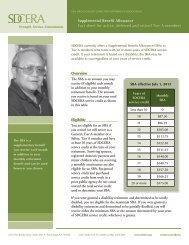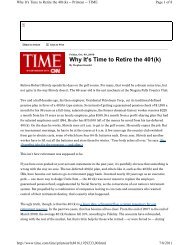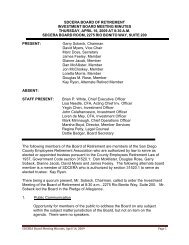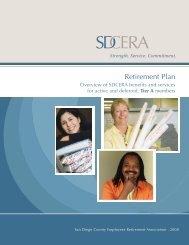County Employees Retirement Law of 1937 (CERL) - sdcera
County Employees Retirement Law of 1937 (CERL) - sdcera
County Employees Retirement Law of 1937 (CERL) - sdcera
You also want an ePaper? Increase the reach of your titles
YUMPU automatically turns print PDFs into web optimized ePapers that Google loves.
expended for any purpose other than the expense <strong>of</strong> administration <strong>of</strong> the system, investments<br />
for the benefit <strong>of</strong> the system, and the provision <strong>of</strong> benefits to the members and retired members<br />
<strong>of</strong> the system and their survivors and beneficiaries.<br />
(Added by Stats. 1983, Ch. 923, Sec. 3)<br />
§31589. Accounting as to transfers or payments to system<br />
All transfers or payments to the retirement system and all withdrawals and other cash<br />
transactions, shall be accounted upon the books <strong>of</strong> the retirement board, or treasurer and<br />
auditor, if authorized by the board, in and out <strong>of</strong> the retirement fund, in the same manner as<br />
county transactions.<br />
(Added by Stats. 1947, Ch. 424, Sec. 1)<br />
(Amended by Stats. 1995, Ch. 584 (A.B. 1021), Sec. 5)<br />
§31589.1. Trade <strong>of</strong> bonds for similar bonds<br />
There is hereby established for accounting purposes in the <strong>County</strong> <strong>Employees</strong><br />
<strong>Retirement</strong> <strong>Law</strong> <strong>of</strong> <strong>1937</strong> the following procedure for treating a trade <strong>of</strong> bonds for similar bonds.<br />
Any loss or gain attributable to a trade <strong>of</strong> a like bond in the portfolio <strong>of</strong> any retirement system<br />
adopted pursuant to this chapter may be amortized over the life <strong>of</strong> the bond traded out by<br />
adding to or subtracting from the discount or premium attributable to the bond traded in.<br />
Like bonds for purposes <strong>of</strong> this section are considered to be bonds which will mature<br />
within seven years <strong>of</strong> the life <strong>of</strong> the bond traded out. Bonds to be traded must be <strong>of</strong> the first<br />
four grades. The fact that one bond may be a debenture and another a mortgage bond, or that<br />
the bonds may have different rates <strong>of</strong> return, shall not keep them from being like bonds.<br />
This section shall not be operative in any county until such time as the board shall, by<br />
resolution adopted by majority vote, make the provisions <strong>of</strong> this section applicable in such<br />
county.<br />
(Added by Stats. 1974, Ch. 1366, Sec. 2)<br />
§31590. Warrants, checks, and electronic fund transfers; signature and authorization; validity;<br />
direct deposit <strong>of</strong> electronic fund transfers; authorization <strong>of</strong> benefit payments issuance<br />
by banks<br />
(a) All warrants, checks, and electronic fund transfers drawn on the retirement fund<br />
shall be signed or authorized by at least two board <strong>of</strong>ficers or employees, designated by the<br />
board or by the treasurer if designated by the board. If the treasurer is designated by the board,<br />
the board shall also designate the auditor to sign or authorize warrants, checks, and electronic<br />
fund transfers. The authorization may be by blanket authorization <strong>of</strong> all warrants, checks,<br />
or electronic fund transfers appearing on a list or register, or may be by a standing order to<br />
draw warrants, checks, or electronic fund transfers, which shall be good until revoked. If the<br />
treasurer and auditor are designated by the board, a warrant, check, or electronic fund transfer<br />
is not valid until it is signed or authorized, numbered, and recorded by the county auditor,<br />
except as provided in subdivision (c).<br />
(b) Any person entitled to the receipt <strong>of</strong> benefits may authorize the payment <strong>of</strong> the<br />
benefits to be directly deposited by electronic fund transfer into the person’s account at the<br />
financial institution <strong>of</strong> the person’s choice under a program for direct deposit by electronic<br />
transfer established by the board or treasurer if authorized by the board. The direct deposit<br />
shall discharge the system’s obligation in respect to that payment.<br />
(c) The board may, or, if authorized by the board, the treasurer shall, authorize a trust<br />
company or trust department <strong>of</strong> any state or national bank authorized to conduct the business<br />
<strong>of</strong> a trust company in this state or the Federal Reserve Bank <strong>of</strong> San Francisco or any branch<br />
131<br />
Article 5, §31588.2. - §31590.


